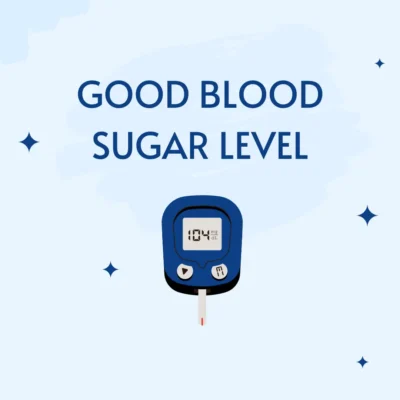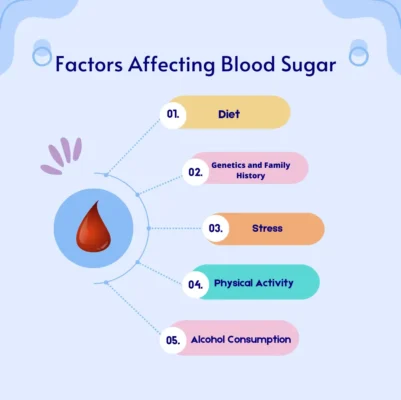
Helping You Understand Normal Blood Sugar Level
Maintaining blood sugar levels is very important for overall health and well-being. As every person is unique, so is their blood glucose level. Keeping track of your blood sugar is an important part of health management. In this blog, we will explore blood sugar levels, their causes, and strategies you can use to keep them in check.
Table of Contents
ToggleWhat Is Blood Sugar or Glucose?

When we eat food, the carbohydrates break down into glucose, and it is the main source of energy in the body. The amount of glucose in your blood is regulated by insulin, a hormone produced by the pancreas. When glucose enters the bloodstream, insulin helps move it to our cells. This entire process lowers the amount of glucose in the blood. When this process works efficiently, our organs and muscles have the energy to perform their routine without leaving too much glucose in the blood.
Good Blood Sugar Level

- Fasting blood sugar: A blood sample is taken after you haven’t eaten anything the night before or after at least eight hours of fasting. A fasting blood sugar level between 70-100 mg/dL is normal, and from 100 to 125 mg/dL is indicates prediabetes. If it’s more than 126 mg/dL on two separate tests, you have diabetes.
- Postprandial blood sugar (after meals): In these tests, blood samples are collected approximately two hours after eating. A normal blood sugar level is considered to be less than 140 mg/dL. However, no matter when you last ate food, if it exceeds 200 mg/dL indicates the possibility of diabetes.
Factors Affecting Blood Sugar

- Diet: The types and amounts of food we consume impact blood sugar levels. Too much food or foods containing more carbohydrates can increase it’s levels. Conversely, not eating enough food can lower blood sugar levels.
- Stress: Stress triggers the release of cortisol, which can raise blood sugar levels. Stress can cause long-term imbalances in glucose regulation. Include stress management techniques in your daily routine, such as meditation, yoga, and deep breathing.
- Alcohol Consumption: Alcohol can affect blood sugar levels, especially if consumed on an empty stomach. It’s essential to drink in moderation and be mindful of potential interactions with diabetes medications.
- Physical Activity: Exercise has a direct impact on insulin. Regular exercise helps regulate blood sugar levels by improving insulin sensitivity, leading to better blood sugar control.
- Genetics and Family History: Genetic factors can influence an individual’s predisposition to diabetes and impact how the body regulates blood sugar. If there is a family history of diabetes, then it may increase the risk.
- Weight: Being overweight or obese can contribute to insulin resistance, making it more challenging for cells to respond to insulin and regulate blood sugar effectively.
Tips for Maintaining Normal Blood Sugar Levels

- Exercise regularly: Engage in regular physical activity, such as brisk walking, jogging, cycling, or any exercise you enjoy. This can enhance insulin sensitivity, allowing cells to better use the sugar in your blood, leading to lower blood sugar levels. Aim for at least 30 minutes of exercise daily to support improved insulin sensitivity and better regulation of glucose levels.
- Balanced Diet: Choose a balanced diet rich in whole grains, lean proteins, fruits, and vegetables while monitoring portion sizes to avoid overeating. Don’t eat too much processed foods and snacks. Keep an eye on carb intake, as they convert to sugar; planning meals helps control blood sugar levels with a low-carb diet offering long-term benefits.
- Manage your stress: Practice stress-reducing techniques such as meditation, deep breathing, or yoga. Chronic stress can contribute to elevated blood sugar levels, so it’s essential to manage stress effectively.
- Drink plenty of water: Stay well-hydrated by drinking plenty of water throughout the day; it will help your kidneys remove excess sugar. Limit the consumption of sugary beverages, as they can lead to spikes in blood sugar levels.
- Get enough sleep: Ensure you get sufficient and quality sleep each night. Poor sleeping habits can promote weight gain and contribute to imbalances in blood sugar levels.
- Regular Health Check-ups: Consistently monitor your blood sugar levels as recommended by your healthcare provider, keeping a close eye on how various foods and activities impact your readings. Additionally, ensure regular health check-ups with your healthcare provider to monitor overall health, including blood sugar levels, and collaborate with your healthcare team for necessary adjustments to your lifestyle and medication when required.
Conclusion
Understanding normal blood sugar levels is a fundamental aspect of promoting overall health. By adopting a healthy lifestyle, making informed dietary choices, and staying physically active, you can contribute to keeping your blood sugar levels within the normal range. Consider visiting Hale Clinics, the Best Multi-Specialty Clinic in Mohali, for personalized advice and guidance on effectively managing your blood sugar levels.
FAQs
Q1 How much blood sugar is?
A: A fasting blood sugar level of 70–100 mg/dL is considered normal, while a level of 100–125 mg/dL is indicative of prediabetes. You have diabetes if the result of two different tests is greater than 126 mg/dL.
Q2 What is diabetes?
A: Diabetes is a chronic illness marked by elevated blood sugar (glucose) levels brought on by the body’s incapacity to make or use insulin efficiently.
Q3 What foods lower blood sugar?
A: Foods like leafy greens, nuts, seeds, and high-fiber fruits such as berries can help lower blood sugar levels.
Q4 What are signs of high blood sugar?
A: Frequent urination, increased thirst, and fatigue are signs of high blood sugar levels.
